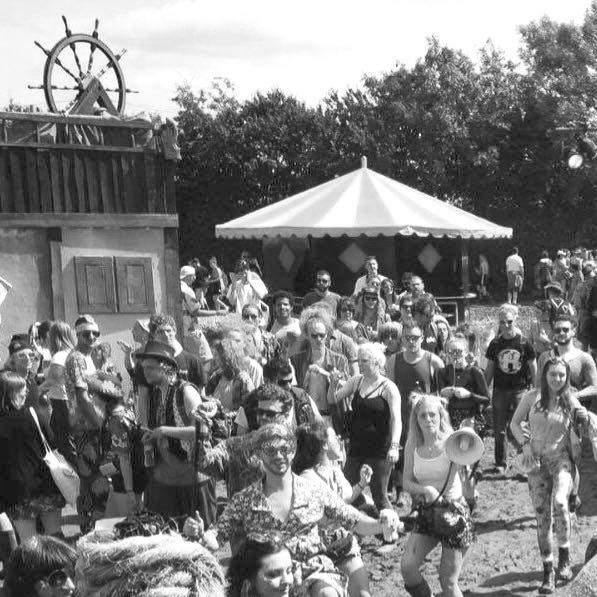Gyms as Shared Play Spaces with Charlie Bones of X-Ray Spexercise
The Good Gym Guide Podcast • Series 1, Episode 4
This episode is with Charlie Bones, who runs the X-Ray Spexercise Punk Aerobics classes. In the familiar environments of music venues and pubs, she pairs classic punk culture with simple aerobic exercises to share the benefits of physical activity with people who can’t stand gyms and gym playlists.
She talks about how she creates an environment where people feel okay to make mistakes, get sweaty, and look silly, and how she avoids common problems of coaching large groups - like cueing better technique without making people feel singled-out.
Charlie’s imagined training space combines huge, unconstrained dreams of beaches, jungles, water slides, live music - with provision of overlooked essentials like childcare, life skills, and affordable food. It’s an environment that wants you to feel good while training, as well as afterwards.
I was really struck by the combination of thinking at that grand scale as well as thinking really specifically about how training spaces must provide affordable childcare if people with children are to use them, drawing on her and her daughter’s own experience. This is obviously hugely important, both for allowing new mums to navigate their relationship to their changing bodies, and potentially to avoid the social isolation that can happen after having a baby.
I think there are further implications for this too - it is not always suitable for someone who’s just been pregnant or had a child to go back to the exercise routine they had before. It may be important to spend some time focusing on pelvic floor health, or specific sorts of core stability, or just spending time reconnecting with your body in its new state before jumping back in to where you were before. At the moment though, that’s not accessible in gyms, coaches aren’t trained in it, and, outside of the gym, we don’t have the same systems for healing and rehabilitation in this country as there are in France, for example.
This is SO important, but it’s so misunderstood, with GPs often prescribing the opposite of what is required - kegels, for example, instead of connected breathing and relaxation exercises. Of course, this is just one of many examples of how the fitness industry, and healthcare more generally, prioritises the needs of men, who don’t experience this in the same way. Pair that with the body image culture we have and the pressure there to get your pre-baby body back and it’s a recipe for real problems, but also an opportunity to make a real difference through quite small changes in how we educate our coaches and what classes we offer.
I thought it was so interesting too how she identified that gyms could be a great service for young people in the same way that sports clubs are, but perhaps reach kids who aren’t drawn to the gendered, competitive culture of most sports. Teenagers, especially, might be able to get a lot from spaces that allow them to explore their bodies, and body image, through exercise. This makes me think of intergenerational social spaces where we could also train together - it would be nice to talk to someone about this in a future episode.
Related to that, I thought it was interesting how there would be a sort of informal space for children to move in - the adventure playground - but that as adults we expect more formal structures - classes, schedules, sets and reps. There are organisations that challenge this and try to offer, for example, playground games for adults - but, to my closed mind, it all gets a bit cringe. There is definitely something interesting there though, and some way of doing it better.
One thing that might be related - which I ended up editing out of the podcast - was Charlie saying about a friend who doesn’t come to her classes because he goes raving and gets all his exercise there. Dance seems to be a sort of acceptable form of adult play, but it’s interesting that that is seen as different to what happens in a gym.
The last bit I wanted to say was about how, even though the space that Charlie imagined was conceived in opposition to the normal shite, it was rooted in fun and compassion, love for movement, and for sharing that with others. It was a real pleasure to talk about.
Charlie’s work
Classes happen at the Exchange, the Lion, and Wellsping Healthy Living Centre
Episode links
Charlie’s done sessions for Extinction Rebellion and Bristol Sisterhood
She’s fundraised for Bristol Refugee Rights and Calais Refugee Solidarity Bristol
The X-Ray Spexercise logo was designed by Maesy Hook, and Charlie’s amazing sportswear was by Betty Bottom Dollar (see the Facebook page for some great progress photos and videos!)
Bands that have donated music to use in classes are Hagar the Womb, the Sporadics, Inner Terrestrials, the Blunders, the Menstrual Cramps, Dog Shite, Anthrax UK, Spanner, Mad Dog Collective and China Shop Bull
The American group doing punk aerobics that Charlie mentioned
Credits
All the photographs above came from Charlie
Most other photographs on this website were taken by Paul Samuel White
Production support by Yas Clarke
Graphic design by Steph Weise



